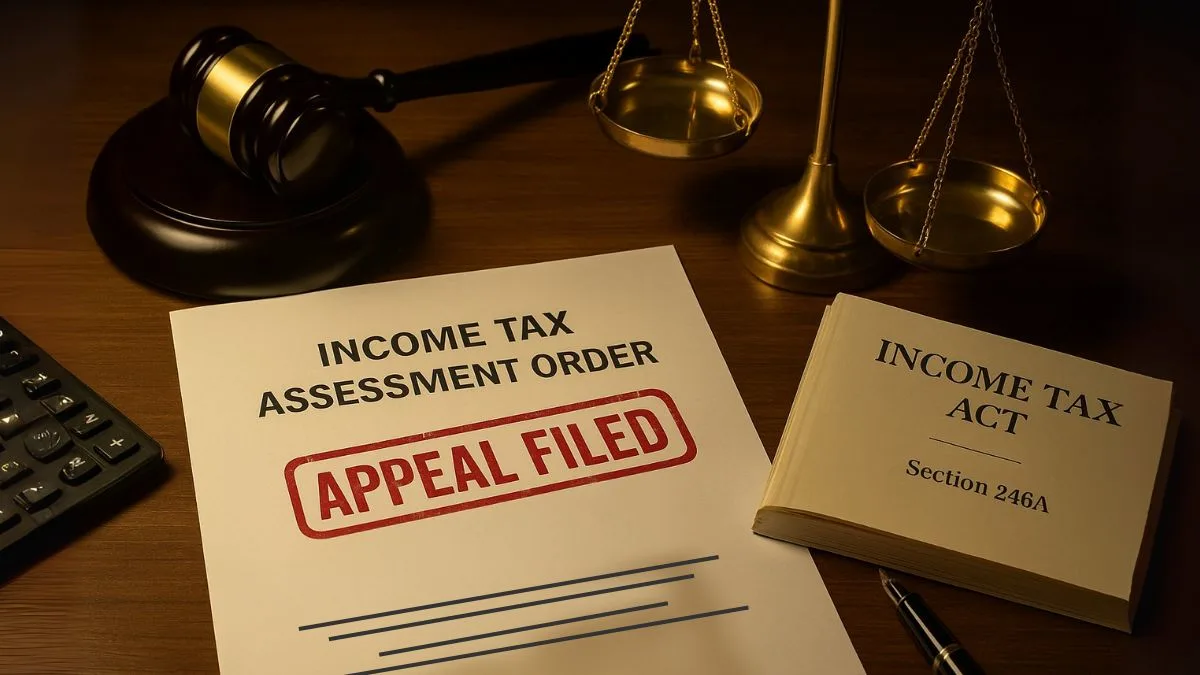
Disputes between taxpayers & the Income Tax Department are not uncommon. Assessments, penalty orders, or demands raised by authorities may sometimes feel unjust or incorrect. To safeguard taxpayers' rights, the Income-tax Act has built-in provisions for appeals.
One of the most critical sections in this regard is Section 246A of Income Tax Act. This section provides a right of appeal to an assessee who is deemed to be in default or is dissatisfied with certain orders passed by the Assessing Officer. It ensures that taxpayers are not left helpless & can approach higher authorities for relief.
Let us explore the scope, significance, and procedures under Section 246A in detail.
What is Section 246A of Income Tax Act?
Section 246A of Income Tax Act lists the appealable orders against which a taxpayer can file an appeal before the Commissioner of Income Tax (Appeals), also known as CIT(A).
In simple terms, if the Income Tax Department passes an order that a taxpayer disagrees with—whether it relates to income assessed, interest charged, or penalty imposed—the taxpayer has a legal right to appeal under this section."
Thus, Section 246A provides a right of appeal to an assessee who is deemed to be in default or aggrieved by the order.
Key Features of Section 246A
- Right to Appeal: Every taxpayer has a statutory right to appeal under this section.
- Wide Coverage: It covers assessments, penalties, TDS/TCS defaults, and other disputes.
- Lists Appealable Orders: Only specific orders mentioned in this section are appealable.
- Time Limit: The appeal must generally be filed within 30 days of receiving the order.
- First Level of Appeal: CIT(A) is the first appellate authority under this section.
This ensures checks & balances within the system, protecting taxpayers from arbitrary or incorrect orders.
Also Read: Appeals Process Before the Commissioner of Income Tax (Appeals)
Appealable Orders under Section 246A
The Income-tax Act specifies the types of orders that can be challenged. Some of the key ones include:
- Orders of assessment under Section 143(3) or best judgment assessment under Section 144.
- Orders relating to TDS defaults or failure to deduct/collect tax.
- Orders imposing penalties under various sections.
- Orders charging interest for defaults in tax payment.
- Orders under Section 201 declaring a person to be an assessee in default.
- Orders relating to rectifications under Section 154.
- Orders rejecting applications for registration of charitable trusts.
Thus, Section 246A of the Income Tax Act lists the appealable orders comprehensively, giving taxpayers clarity on when they can approach CIT(A).
Procedure for Filing Appeal
- Drafting the Appeal: The appeal must be filed in the prescribed form (Form 35).
- Filing Online: Appeals are now filed electronically through the e-filing portal.
- Time Limit: Must be filed within 30 days from the date of the order.
- Payment of Fees: A nominal fee is payable depending on the assessed income.
- Hearing: The CIT(A) may call for additional documents, hear arguments, and decide the matter.
This process is designed to be fair, giving taxpayers a structured platform to present their side.
Also Read: Provision for Cases Where Assessment is in Pursuance of an Order on Appeal
Importance of Section 246A
- Protects Taxpayer Rights: No one can be unfairly treated without the chance of appeal.
- Checks Arbitrary Powers: Prevents misuse of authority by income tax officers.
- Encourages Transparency: By providing an independent appellate authority."
- Strengthens Trust: Builds confidence between taxpayers & the system.
- Ensures Fair Justice: Offers relief to taxpayers facing incorrect or high-pitched assessments.
Example
Let’s say Mr. Raj is assessed with an additional income of ₹10 lakh by his Assessing Officer, along with penalties. Mr. Raj believes the assessment is incorrect.
- Under Section 246A, he can file an appeal before CIT(A).
- The appellate authority will examine facts, documents, & arguments."
- If satisfied, the CIT(A) can reduce or cancel the assessment/penalty.
This example shows how Section 246A of Income Tax Act provides a right of appeal to an assessee who is deemed to be in default.
Challenges in Using Section 246A
- Delays: Appeals may take months or even years to resolve."
- Costs: Though filing fees are low, professional representation can be expensive.
- Complexity: Taxpayers may need expert guidance to present cases effectively.
Despite these, it remains one of the most vital remedies for taxpayers.
Also Read: Appeals to the High Court Explained
Conclusion
Section 246A of Income Tax Act provides a right of appeal to an assessee who is deemed to be in default. Section 246A of the Income Tax Act lists the appealable orders, enabling taxpayers to challenge unfair assessments, penalties, or demands.
It is a cornerstone of taxpayer protection in India, ensuring that justice is not denied due to one-sided orders. While appeals may take time, they provide an essential safeguard in the taxation framework.
💡 Facing a dispute with the Income Tax Department?
Don’t worry—Callmyca.com helps you file appeals & represent your case effectively so you don’t lose your hard-earned money to unfair demands.











